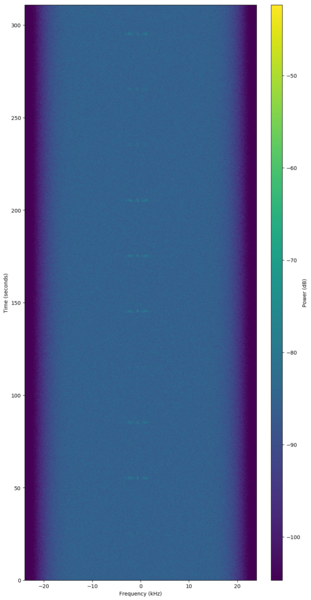Difference between revisions of "MSK"
From SatNOGS Wiki
(MSK stub [https://en.wikipedia.org/wiki/Minimum-shift_keying Minimum-shift keying]) |
(MSK waterfalls) |
||
| Line 1: | Line 1: | ||
| − | == | + | == Introduction == |
In digital modulation, minimum-shift keying (MSK) is a type of continuous-phase frequency-shift keying that was developed in the late 1950s by Collins Radio employees Melvin L. Doelz and Earl T. Heald. Similar to OQPSK, MSK is encoded with bits alternating between quadrature components, with the Q component delayed by half the symbol period. | In digital modulation, minimum-shift keying (MSK) is a type of continuous-phase frequency-shift keying that was developed in the late 1950s by Collins Radio employees Melvin L. Doelz and Earl T. Heald. Similar to OQPSK, MSK is encoded with bits alternating between quadrature components, with the Q component delayed by half the symbol period. | ||
| + | |||
| + | == Waterfalls == | ||
| + | Example waterfalls below: | ||
| + | |||
| + | <gallery mode="packed" widths=310px heights=400px> | ||
| + | File:Waterfall_1520385_2020-01-10T13-55-32.png|[[MSK1k2]] | ||
| + | </gallery> | ||
== See also == | == See also == | ||
* [https://en.wikipedia.org/wiki/Minimum-shift_keying Minimum-shift keying] | * [https://en.wikipedia.org/wiki/Minimum-shift_keying Minimum-shift keying] | ||
| + | |||
| + | [[Category:RF Modes]] | ||
Latest revision as of 23:40, 14 January 2020
Introduction
In digital modulation, minimum-shift keying (MSK) is a type of continuous-phase frequency-shift keying that was developed in the late 1950s by Collins Radio employees Melvin L. Doelz and Earl T. Heald. Similar to OQPSK, MSK is encoded with bits alternating between quadrature components, with the Q component delayed by half the symbol period.
Waterfalls
Example waterfalls below:
